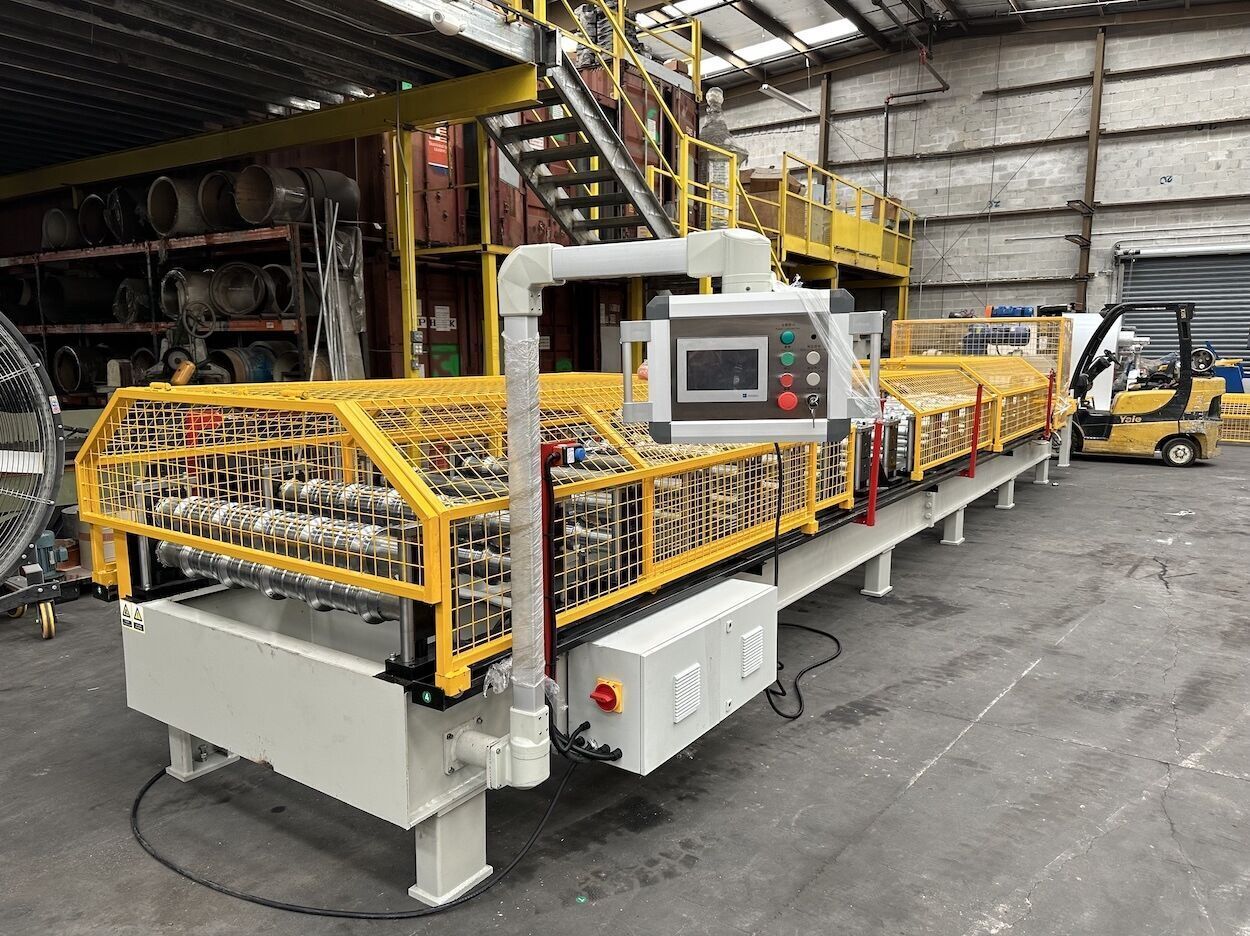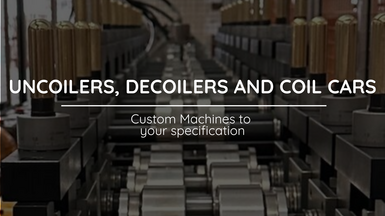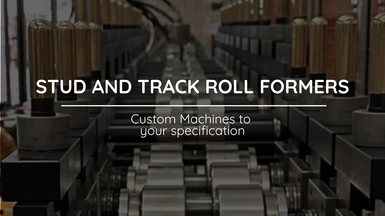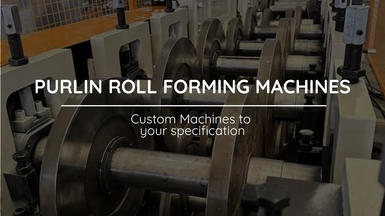
Metal Roofing Machine
Metal roofing machines come in various configurations, including portable and stationary models.
Posted on Saturday, November 25, 2023
A metal roofing machine, also known as a metal roof roll forming machine or a metal roof panel machine, is a specialized piece of equipment used in the construction industry to manufacture metal roofing panels and sheets. These machines are designed to efficiently produce custom lengths of metal roofing materials, which are commonly used for residential, commercial, and industrial roofing applications due to their durability and longevity.
Here are some key features and components commonly found in a metal roofing machine:
- Uncoiler: This component holds the coil of metal sheet material, often made of steel or aluminum, that will be fed into the machine for forming.
- Feeding System: The metal coil is fed into the machine through a set of rollers or other mechanisms, ensuring a consistent and smooth material feed.
- Roll Forming Stations: The heart of the machine consists of a series of rollers and tooling that gradually shape the flat metal sheet into the desired profile or corrugation for the roofing panels. These rollers are often adjustable to accommodate different panel profiles and dimensions.
- Cutting Mechanism: Some metal roofing machines include a built-in cutting system that trims the formed panels to the desired length, while others may require a separate cutting machine.
- Control System: Modern metal roofing machines are equipped with computerized control systems that allow operators to set parameters such as panel length, thickness, and profile. These systems ensure precision and consistency in panel production.
- Stacker or Shear: After the panels are formed and cut to the desired length, they may be stacked for packaging and transportation or trimmed to the correct size with a shear.
Metal roofing machines come in various configurations, including portable and stationary models. The choice of machine depends on the production volume and specific requirements of the roofing project.
These machines offer several advantages, including high production speeds, customization options, and cost-efficiency in the long run. They are commonly used by roofing manufacturers and contractors to produce metal roofing materials tailored to the needs of their clients.
It's important to note that the specific features and capabilities of metal roofing machines may vary depending on the manufacturer and model, so users should carefully select a machine that suits their production requirements. Additionally, proper training and safety precautions should be followed when operating these machines to prevent accidents and ensure product quality.
What panels can a Metal roofing machine make
A metal roofing machine is a versatile piece of equipment that can produce a wide variety of metal roofing panels with different profiles, shapes, and dimensions. The panels that can be produced by a metal roofing machine depend on the machine's design and the available tooling or roller sets. Here are some common types of metal roofing panels that can be made using a metal roofing machine:
- Standing Seam Panels: Standing seam roofing panels are characterized by raised vertical seams that connect adjacent panels. These seams are typically formed by a series of interlocking ribs. Standing seam roofs are known for their sleek, modern appearance and weather resistance.
- Corrugated Panels: Corrugated metal roofing panels have a wavy or corrugated profile. They are often used for agricultural, industrial, and residential roofing applications. The corrugations add strength to the panels while allowing for water drainage.
- Ribbed Panels: Ribbed or R-panel roofing panels feature continuous ribs or striations running horizontally across the panel surface. They are popular for commercial and industrial buildings due to their strength and ease of installation.
- Trapezoidal Panels: Trapezoidal roofing panels have a trapezoid-shaped profile with parallel sides and sloping top and bottom surfaces. They are commonly used in industrial and agricultural settings.
- Snap-Lock Panels: Snap-lock roofing panels have a design that allows adjacent panels to snap or interlock together without the need for exposed fasteners. This creates a clean and watertight roof surface.
- Mechanical Lock Panels: Mechanical lock panels have a locking mechanism that secures adjacent panels together, providing a secure and watertight roofing system.
- Dutch Seam Panels: Dutch seam roofing panels have a unique design with a concealed fastening system. They are often used for architectural and residential roofing projects.
- Tile and Shingle Panels: Some metal roofing machines can produce panels that mimic the appearance of traditional clay tiles or asphalt shingles. These panels offer the aesthetic appeal of traditional roofing materials with the durability of metal.
- Custom Profiles: Metal roofing machines can also be set up to produce custom profiles to meet specific design requirements.
The ability to create different types of panels depends on the specific machine's capabilities and the tooling or rollers it is equipped with. Roofing manufacturers and contractors often choose metal roofing machines that can be adapted to produce the desired panel profiles for their projects. Additionally, these machines can typically produce panels in various gauges (thicknesses) and materials, such as steel, aluminum, or copper, further expanding their versatility.
What material would you use on a Metal roofing machine
Metal roofing machines are designed to work with a variety of metal materials, and the choice of material depends on factors like the specific application, budget, desired appearance, and local environmental conditions. Here are some common metal materials used with metal roofing machines:
- Steel: Steel is one of the most popular materials for metal roofing panels due to its strength, durability, and affordability. Galvanized steel is often used to resist corrosion, while galvalume (a combination of galvanized steel and aluminum) provides enhanced corrosion resistance.
- Aluminum: Aluminum roofing panels are lightweight, corrosion-resistant, and ideal for coastal or marine environments. They are also commonly used when weight is a concern, such as for mobile homes or portable structures.
- Copper: Copper roofing panels are known for their distinctive appearance and long-term durability. Over time, copper develops a natural patina that can enhance its aesthetic appeal. Copper is often chosen for architectural or high-end residential applications.
- Zinc: Zinc roofing panels offer excellent corrosion resistance and have a unique, evolving appearance as they develop a protective zinc patina over time. They are commonly used in architectural roofing projects.
- Stainless Steel: Stainless steel is highly resistant to corrosion and staining, making it suitable for harsh environments and applications where aesthetics are important. It's often chosen for modern and commercial buildings.
- Terne Coated Stainless Steel: Terne-coated stainless steel combines the durability of stainless steel with a tin and zinc coating for enhanced corrosion resistance. It's a choice for roofing projects requiring longevity and a traditional appearance.
- Painted or Coated Steel/Aluminum: Metal roofing panels can be coated with various finishes, such as polyester, silicone polyester, or Kynar (PVDF) paint systems, to provide protection and aesthetic appeal. These coatings come in a wide range of colors and finishes.
The choice of material depends on factors like the local climate, the building's purpose, budget constraints, and aesthetic preferences. It's important to select a material that not only suits the project's needs but also aligns with the manufacturer's capabilities and the intended design of the roofing panels.
Additionally, some metal roofing machines are designed to work with specific materials, so it's crucial to ensure that the chosen machine is compatible with the material you intend to use. Proper material selection, along with quality installation and maintenance, will help ensure the longevity and performance of the metal roofing system.
Is it better to buy a new or used metal roof machine
Whether it's better to buy a new or used metal roof machine depends on several factors, including your budget, production needs, and the condition of the used machine. Here are some considerations to help you make an informed decision:
Buying a New Metal Roof Machine:
Pros:
- Reliability: New machines typically come with warranties and are less likely to have significant maintenance or wear-and-tear issues, offering a high level of reliability.
- Latest Technology: New machines often incorporate the latest advancements in technology, which can lead to improved efficiency, productivity, and ease of use.
- Longevity: A new machine is likely to have a longer operational lifespan compared to a used one, potentially providing a better return on investment over time.
- Customization: You can often specify the features and capabilities you need in a new machine to meet your specific production requirements.
Cons:
- Higher Cost: New machines are generally more expensive upfront, which may be a significant factor if you have budget constraints.
- Depreciation: Like any new equipment, a new metal roof machine will experience depreciation over time.
Buying a Used Metal Roof Machine:
Pros:
- Cost Savings: Used machines are typically less expensive than new ones, making them a more budget-friendly option for businesses with limited capital.
- Immediate Availability: You can often find used machines on the market more quickly than new ones, which can be beneficial if you need to start production right away.
- Lower Depreciation: Since much of the depreciation may have already occurred, the resale value of a used machine may be more stable.
Cons:
Whether it's better to buy a new or used metal roof machine depends on several factors, including your budget, production needs, and the condition of the used machine. Here are some considerations to help you make an informed decision:
Buying a New Metal Roof Machine:
Pros:
- Reliability: New machines typically come with warranties and are less likely to have significant maintenance or wear-and-tear issues, offering a high level of reliability.
- Latest Technology: New machines often incorporate the latest advancements in technology, which can lead to improved efficiency, productivity, and ease of use.
- Longevity: A new machine is likely to have a longer operational lifespan compared to a used one, potentially providing a better return on investment over time.
- Customization: You can often specify the features and capabilities you need in a new machine to meet your specific production requirements.
Cons:
- Higher Cost: New machines are generally more expensive upfront, which may be a significant factor if you have budget constraints.
- Depreciation: Like any new equipment, a new metal roof machine will experience depreciation over time.
Buying a Used Metal Roof Machine:
Pros:
- Cost Savings: Used machines are typically less expensive than new ones, making them a more budget-friendly option for businesses with limited capital.
- Immediate Availability: You can often find used machines on the market more quickly than new ones, which can be beneficial if you need to start production right away.
- Lower Depreciation: Since much of the depreciation may have already occurred, the resale value of a used machine may be more stable.
Cons:
- Potential Maintenance Needs: Used machines may require more maintenance or repairs, which can add to the total cost of ownership.
- Limited Warranty: Used machines may not come with warranties or have limited warranty coverage, increasing the risk of unexpected repair costs.
- Compatibility and Upgrades: Older used machines may not be as compatible with newer tooling or technology upgrades, potentially limiting their flexibility.
- Unknown History: You may not have a complete understanding of how well the used machine was maintained or the conditions it operated under.
When deciding between a new or used metal roof machine, it's essential to carefully evaluate your specific needs, budget, and long-term goals. If you have the financial resources and prioritize reliability and the latest technology, a new machine may be the better choice. However, if budget constraints are a significant factor and you can find a well-maintained used machine that meets your production requirements, it can be a cost-effective option.
Regardless of your choice, it's advisable to work with reputable suppliers or dealers who can provide you with information about the condition, maintenance history, and any warranties associated with a used machine. Additionally, thoroughly inspect and test any used machine before purchasing to ensure it meets your expectations and operational needs.
How much does a metal roof machine cost
The cost of a metal roof machine can vary widely depending on several factors, including the type of machine, its capacity, features, and the manufacturer or supplier. Here are some general price ranges for different types of metal roof machines as of my last knowledge update in January 2022:
- Portable Roll Formers: Portable roll forming machines, which are suitable for smaller-scale or mobile roofing projects, can range from $10,000 to $40,000 or more, depending on their capabilities and the materials they can work with.
- Stationary Roll Formers: Stationary roll forming machines designed for larger-scale roofing production can vary significantly in price. They can start at around $50,000 to $100,000 for basic models and can go up to several hundred thousand dollars for high-capacity and fully automated systems.
- Custom or Specialized Machines: Custom-designed or specialized metal roof machines with unique features or capabilities may have prices that vary widely based on the complexity of the design and specific requirements.
- Used Machines: The cost of a used metal roof machine can be significantly lower than that of a new one. Used machines may range from a few thousand dollars to tens of thousands of dollars, depending on their age, condition, and features.
It's important to note that these price ranges are approximate and can vary based on factors such as the machine's specifications, the complexity of the roofing profiles it can produce, the quality of materials used in its construction, and whether it includes additional features such as a cutting system or a computerized control panel.
When considering the purchase of a metal roof machine, it's crucial to:
- Define your specific production needs and capacity requirements.
- Compare quotes from multiple suppliers or manufacturers to get a better understanding of pricing and available options.
- Consider the long-term cost of ownership, including maintenance, operating costs, and potential downtime.
- Evaluate the reputation and reliability of the manufacturer or supplier.
- Determine whether you need any additional accessories or tooling for your specific roofing profiles.
Keep in mind that prices may have changed since my last knowledge update, so I recommend reaching out to suppliers, manufacturers, or distributors for the most up-to-date pricing information and to discuss your specific requirements.
Roll Forming Machines LLC's New Factory
Posted on Sunday, March 23, 2025
We have relocated factories, which will be available for tours very soon.

Uncoiler, Decoiler and Coil Car Roll Forming Machine Accesories from Roll Forming Machines LLC
Posted on Sunday, November 24, 2024
Contact us today with your specifications for a custom Uncoiler, Decoiler or Coil Car at sales@rollformerusa.com or call us at (+1) (407) 859 1119

Stud and Track Roll Forming Machines from Roll Forming Machines LLC
Posted on Saturday, November 23, 2024
Contact us today with your specifications for a custom Stud and Track Machine at sales@rollformerusa.com or call us at (+1) (407) 859 1119

Cee and Zee Purlin Roll Forming Machines from Roll Forming Machines LLC
Posted on Saturday, November 23, 2024
Contact us today with your specifications for a custom Cee and Zee Purlin Machine at sales@rollformerusa.com or call us at (+1) (407) 859 1119